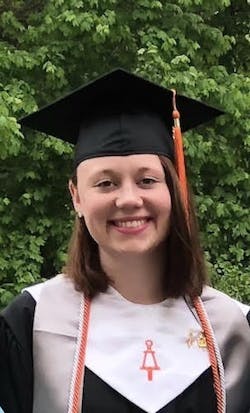Where Are They Now? 2017 WWEMA/WWD Scholarship Recipient
Interview compiled by Sara Myers
undefinedIn November 2017, in conjunction with the Water & Wastewater Equipment Manufacturers Assn., Water & Wastes Digest awarded a $1,000 scholarship to Erika Addison. Applications for this year’s WWEMA/WWD Scholarship are open with a deadline of Oct. 19.
Addison graduated with a Bachelor of Science in civil and environmental engineering in May 2018 from the University of Rhode Island. During her undergrad, Addison conducted research with Dr. Joseph Goodwill on a physical-chemical process used to improve water reuse capabilities. She was also involved with the American Society of Civil Engineers and Chi Epsilon.
Water & Wastes Digest Associate Editor Sara Myers caught up with Addison to see what she has been up to since receiving her scholarship award last year.
Sara Myers: What have you been up to since receiving the scholarship? Did you graduate from college?
Erika Addison: Yes, I graduated with my bachelors and am now pursuing my masters degree.
Myers: What are you pursuing for your master’s?
Addison: It’s Environmental Engineering and its still at the University of Rhode Island. My undergrad was in civil and environmental engineering, so it’s just kind of a continuation.
Myers: What types of classes are you currently taking?
Addison: I’m actually doing a research thesis for my masters. So, for my research I’m working with ferrate, which is iron 6, and hopefully trying to get rid of algae, like algae blooms in drinking water. That’s just a short summary of what I’m doing.
Myers: I understand you had a internship at Aerzen USA. How was that experience? What did you learn there?
Addison: It was good. I was doing a project through school, so my internship also counted as a class towards my undergrad. I was helping Aerzen [USA] develop a water treatment monitoring system—they make turbo blowers that are used in water treatment—so, just kind of like a monitored ammonia [system] and how much air needed to be added. But, it was interesting.
Myers: What would you like to be doing after graduate school? Any specific goals?
Addison: I hope to work somewhere in the water treatment or drinking water industry.
Myers: Did you always want to pursue a career in engineering?
Addison: Both my parents are engineers but different types. Engineering was always really the only career path I knew for a really long time. But I always liked math and science so it just came kind of naturally.
